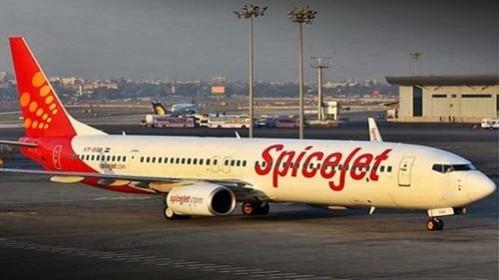
The National Company Law Tribunal (NCLT) has issued a notice to the SpiceJet. The notice was issued in response to a plea by Techjockey Infotech Pvt Ltd, an operational creditor of the airline, seeking the initiation of corporate insolvency resolution proceedings against the beleaguered airline. The plea was filed under Section 9 of the Insolvency and Bankruptcy Code, 2016, by the software solutions startup, Techjockey Infotech Private Ltd. The company alleges that SpiceJet defaulted on a debt of around Rs 1.18 crore, which originated from a 2021 agreement in which SpiceJet acquired cloud services.
The bench comprising Judicial Member Mahendra Khandelwal and Technical Member Dr Sanjeev Tanjan issued the notice, marking another chapter in the ongoing financial woes of the airline. The case has been admitted for consideration by the NCLT and is scheduled to be heard on November 14. The plea, filed through advocates Vishal Ganda and Varun Kumar for Karanjawala & Company, added that the said debt has, in fact, been acknowledged by the corporate debtor and yet there has been no compliance.
This case is not an isolated incident but adds to a growing list of insolvency cases against SpiceJet for unpaid dues to various vendors and aircraft lessors. The pleas from Aircastle, AWAS 36698 Ireland, AWAS 36694 Ireland, and AWAS 36695 remain pending, along with Shannon Engine Support Ltd and Engine Lease Finance B.V.

In a related development last week, the Supreme Court upheld the Delhi High Court's directive requiring SpiceJet to ground and return three aircraft engines leased from French companies due to non-payment of dues, while dismissing the airline's appeal. A division bench of the Delhi High Court had upheld a single-judge bench's order asking SpiceJet to ground three engines by February 16, apart from taking steps to ensure that the engines are re-delivered to lessors within 15 days.
Justice Manmeet Singh Arora, in his judgment, observed: The defendant (SpiceJet) is a defaulter and has no legal and contractual right to continue the use of the engines. The inability of the defendant to pay the admitted outstanding dues is writ large on the face of the record and in fact, permitting the defendant to continue the use of the engines without payment would only cause financial distress to the plaintiff (lessors).
In response to these developments, SpiceJet issued a statement saying it is currently in discussions with the aircraft lessor to reach an amicable settlement. The airline emphasized that two of the three engines in question are already grounded, and their operations remain completely normal and unaffected. They further added, We remain committed to ensuring seamless operations.
However, the financial troubles of SpiceJet are far from over. The airline's market share shrunk by 80 bps to 2.3 per cent (month-on-month) in August, largely due to financial woes and increased grounding, carrying just 3.01 lakh domestic passengers. In a bid to address these financial issues, the board of the embattled SpiceJet has approved the issuance and allotment of 48.70 crore equity shares to qualified institutional buyers at Rs 61.60 per share to raise Rs 3,000 crore.
This situation is reminiscent of the financial troubles faced by Kingfisher Airlines in 2012. The airline, owned by liquor baron Vijay Mallya, was grounded after it failed to pay its employees and creditors, leading to its license being suspended by the Directorate General of Civil Aviation (DGCA). The case of Kingfisher Airlines serves as a stark reminder of the potential consequences of financial mismanagement in the aviation industry.

















